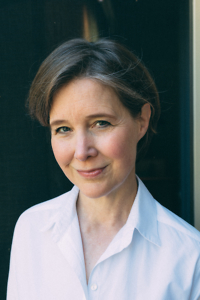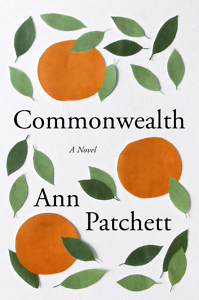Ann Patchett’s new novel, Commonwealth, asks a question to keep you up at night, a question to trouble your soul under certain moons: What if? In this case—what if things had gone just a little bit differently on the day of baby Franny’s christening party? It’s 1963, and Los Angeles police officers and their families fill Beverly and Fix’s home. Bert, an attorney at the local D.A.’s office, hears about the party and shows up uninvited. As Patchett writes in one of the best opening lines to be found in any novel, “The christening party took a turn when Albert Cousins arrived with gin.”

From this, all else follows. Bert and Beverly fall in love, they leave their spouses, they marry. Together they bring six children to the marriage, but they’re no Brady Bunch. The newly married couple leaves California for Virginia, dragging Beverly’s two daughters along. Bert’s four children stay behind with his ex-wife, Teresa. Every summer the California kids join the family in Virginia, where they enjoy hours of unsupervised time (as children did in the 1970s). Perhaps an accident was bound to happen.
The novel plays out over half a century in the lives of the siblings and their parents. Love withers, love grows. Patchett has said that Commonwealth is more overtly autobiographical than her other novels. Her own father was a police officer in California; her parents also divorced and remarried, bringing stepsiblings into the mix; and she too grew up in the 1970’s. But the book is autobiographical only in its vaguest outlines. “Most of the things in this book didn’t actually happen, but the feelings are very close to home,” she told Musing, the house literary journal at Parnassus Books. “Or, as my mother said, ‘None of it happened and all of it’s true.’”
As we watch the children in Commonwealth grow up (and their parents grow old), one of Patchett’s main themes emerges: the greatest dangers in life are not external but those that lie within us. It’s not the car wreck or the criminal we should fear, but the disease or genetic anomaly that lies in wait and emerges in the fullness of time. Our own decisions—those made and not yet made—are perhaps even more to be feared. “There’s no protecting anyone,” Fix says. “Keeping people safe is a story we tell ourselves.” The best thing you can do, Patchett seems to suggest, is hold the hand of the person next to you when life puts you side by side. That’s what you do in a commonwealth.
 But what if, in the commonwealth of a blended family, one person tells the family’s secrets to an outsider? Baby Franny, all grown up, falls in love with Leon Posen, a famous novelist thirty years her senior. She tells him about Bert and Beverly, the siblings, the summertime tragedy and its aftermath—a story he lightly fictionalizes in what becomes a bestselling novel. The characters in Ann Patchett’s Commonwealth struggle with the way they are portrayed in Leon Posen’s Commonwealth: Posen has captured some kind of truth, but it is not their truth, and Franny fears that she has betrayed her family. In giving her novel the same title as the fictional novel at the center of this story, Patchett seems to be exploring the nature of the novelist’s task: an author works from the source material of life to create an artistic truth that is both close to and impossibly distant from its origin.
But what if, in the commonwealth of a blended family, one person tells the family’s secrets to an outsider? Baby Franny, all grown up, falls in love with Leon Posen, a famous novelist thirty years her senior. She tells him about Bert and Beverly, the siblings, the summertime tragedy and its aftermath—a story he lightly fictionalizes in what becomes a bestselling novel. The characters in Ann Patchett’s Commonwealth struggle with the way they are portrayed in Leon Posen’s Commonwealth: Posen has captured some kind of truth, but it is not their truth, and Franny fears that she has betrayed her family. In giving her novel the same title as the fictional novel at the center of this story, Patchett seems to be exploring the nature of the novelist’s task: an author works from the source material of life to create an artistic truth that is both close to and impossibly distant from its origin.
Patchett’s seven novels all consider the question of what it means to live in commonwealth with others. “I’ve got one book in me,” she told Publishers Weekly. “I take it to the jungle, I take it to the opera, I take it to a home for unwed mothers, but it’s always the story I can’t get away from: a group of strangers are thrown together by chance and form a society.” Nevertheless, to create a story with ten protagonists that spans fifty years—and at least five settings spread across the globe—is a balancing act that requires immense narrative skill, and Patchett never falters.
Even when everyone is doing the best they can in Patchett’s newest commonwealth, there is a certain resignation in these pages. As Patchett writes of the wife Bert left behind in California, “Life, Teresa knew by now, was a series of losses. It was other things, too, better things, but the losses were as solid and dependable as the earth itself.” Late in life, Teresa’s share of happiness brings her to tears—of joy and surprise—shed quietly by herself in the bathroom before she returns to her family. “It was what she had hoped for,” Patchett writes, “but never for a minute what she’d expected.” This novel is everything readers hope for and expect from Ann Patchett: a rich, complicated story full to bursting with heartache and heart.
 A graduate of Harvard University and the University of North Carolina at Chapel Hill, Jennifer Puryear is the founder and editor of Bacon on the Bookshelf. She lives in Nashville.
A graduate of Harvard University and the University of North Carolina at Chapel Hill, Jennifer Puryear is the founder and editor of Bacon on the Bookshelf. She lives in Nashville.
Tagged: 2016 Southern Festival of Books, Ann Patchett, Fiction





